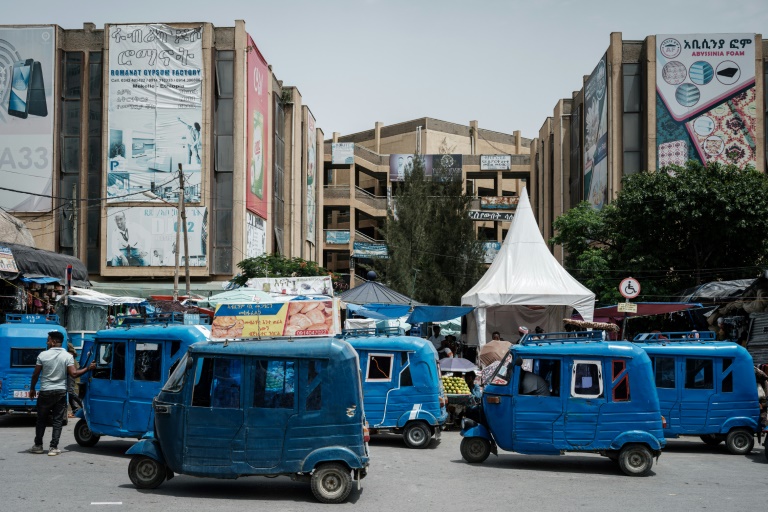Rebel fighters in Ethiopia’s war-hit Tigray seized control of more territory on Tuesday, one day after retaking the local capital and vowing to drive all “enemies” out of the region.
The rebels’ gains and militant rhetoric cast doubt on whether a unilateral ceasefire declared Monday by the federal government would actually lead to a pause in the nearly eight-month-old conflict that has killed thousands of people and pushed hundreds of thousands to the brink of famine.
Prime Minister Abiy Ahmed, winner of the 2019 Nobel Peace Prize, sent troops into Tigray last November to oust the northern region’s former ruling party, the Tigray People’s Liberation Front (TPLF).
He said the move came in response to TPLF attacks on federal army camps, and promised that victory would be swift.
But on Monday his military suffered a dramatic reversal when rebels known as the Tigray Defence Forces (TDF) reclaimed the regional capital Mekele, only about a week after launching a major counter-offensive.
They followed that on Tuesday by entering the town of Shire, about 140 kilometres (90 miles) northwest of Mekele, according to a UN security source and a security assessment document seen by AFP.
The news has prompted street celebrations in multiple locations as federal soldiers, their Eritrean allies and members of an Abiy-appointed interim regional government have fled their posts.
A statement overnight from Tigray’s pre-war government hailed the TDF advances and called for its fighters to press further.
“The government of Tigray calls upon our people and army of Tigray to intensify their struggle until our enemies completely leave Tigray,” it said.
The International Crisis Group, a conflict prevention organisation, said Tuesday that the TDF was “now in control of most of the region, including major towns”.
The TDF achieved its gains “mainly through mass popular support and capturing arms and supplies from adversaries,” said senior analyst William Davison.
– Rebels march on –
Communications were cut throughout Tigray on Tuesday, making it difficult to verify multiple reports of troop movements.
But by Tuesday afternoon UN officials had confirmed TDF forces were in Shire.
“The population has taken to the streets in droves. Huge crowds line the main routes and movement is somewhat difficult,” a UN security assessment document said.
Shire is home to hundreds of thousands of displaced Tigrayans, and the assessment noted that humanitarian operations continued even after the first four vehicles carrying TDF forces arrived from the east.
More TDF fighters were expected to reach Shire later in the afternoon and evening.
For months the TDF did not hold any major cities and towns, but its leaders have repeatedly boasted that they were regrouping in remote rural areas.
Its current offensive was timed to coincide with Ethiopia’s highly anticipated national elections, which took place June 21 in much of the country — though not in Tigray — and were expected to deliver Abiy a comfortable victory.
– ‘Difficult’ road to peace –
The brutal war in Tigray has been marked by massacres, widespread sexual violence and other abuses.
The United Nations has also warned that roughly 350,000 people face starvation.
The World Health Organization on Tuesday reiterated concerns about access to health care in the region, warning of potential outbreaks of cholera, measles, malaria and yellow fever.
In announcing its ceasefire Monday, the federal government said it would last until the end of the current “farming season” and was intended to facilitate agricultural production and aid distribution while allowing rebel fighters “to return to a peaceful road”.
UN Secretary-General Antonio Guterres said Monday he had spoken with Abiy and was “hopeful that an effective cessation of hostilities will take place”.
China, France and the United Arab Emirates all issued statements Tuesday welcoming the ceasefire.
Britain, the United States and Ireland have called for an emergency UN Security Council public meeting, which could happen on Friday, diplomats said.
The Security Council has failed to hold a public session on Tigray since the war erupted, with many African countries, China, Russia and other nations deeming the crisis an internal Ethiopian affair.
Throughout the fighting, Abiy has benefited from the backing of soldiers from neighbouring Eritrea and Ethiopia’s Amhara region, which borders Tigray to the south.
These forces’ involvement “will complicate a blanket application of a temporary ceasefire, which so far appears to be a mostly unilateral move by the federal government”, said Connor Vasey, analyst with the risk consultancy Eurasia Group.
Should discussions on a possible political settlement actually go ahead, they “are likely to be difficult and protracted”, Vasey said.










